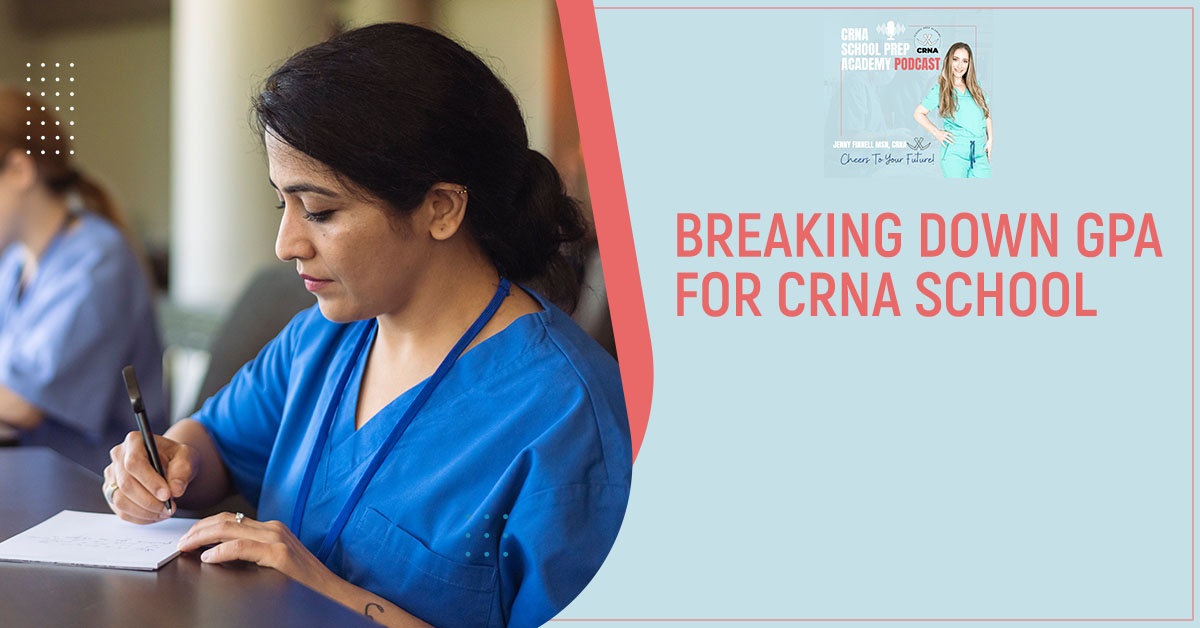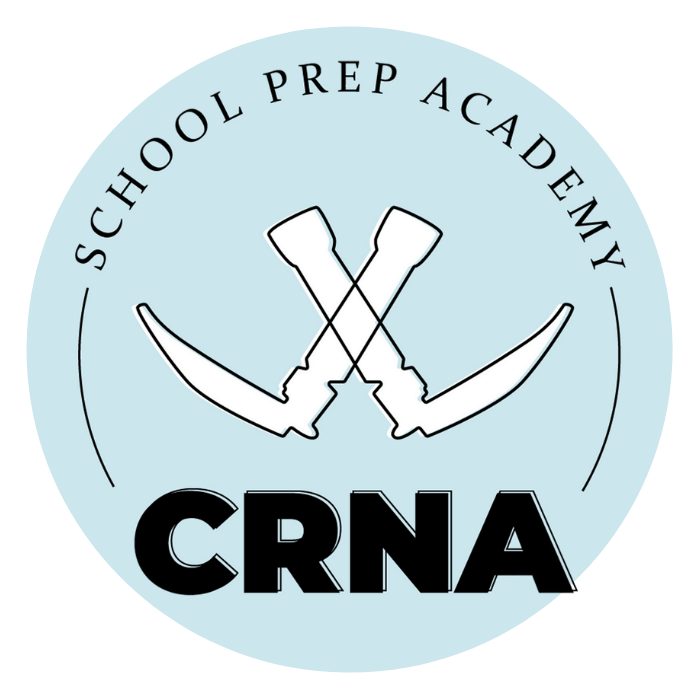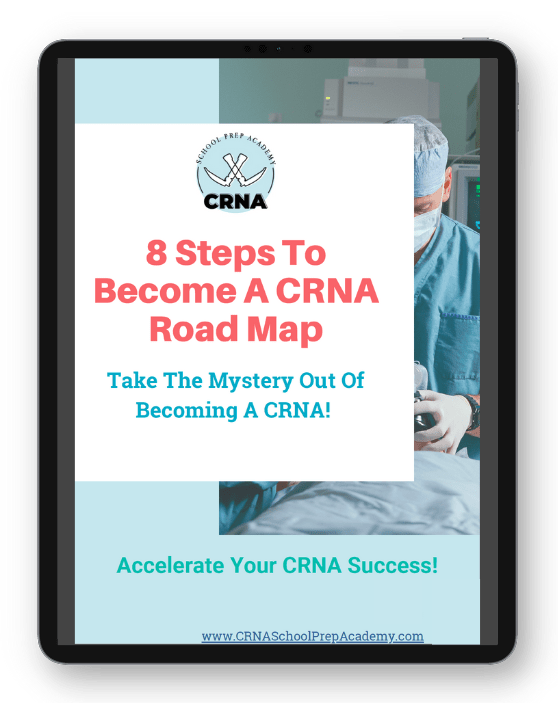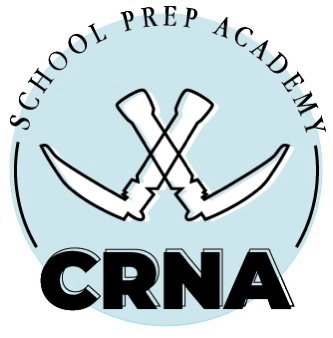
GPA isn’t as bright and shiny as you’d like it to be? This is a common fear that students express- maybe they aren’t smart enough or cut out to become a CRNA? While it’s true that you may have to put in a little more front work before applying, this dream is still very much within your reach!
GPA is only one part of your application, and there are plenty of 4.0 students who don’t gain acceptance or struggle through school. Even with a lower GPA, we’re taking a look at the proactive steps that you can take to boost your application and set yourself up for success.
In today’s episode, you’ll learn:
The importance of reaching out to your program before you apply
The most important characteristics that schools are looking for (beyond the GPA) that denote a competitive candidate
How to break down your GPA and get a real picture for areas of potential improvement
Why your interview ultimately holds more weight than your GPA
Resources available to you for transcript reviews, mock interviews, and more
The key components you actually need to be successful in CRNA school
Know that we’re rooting for you, future CRNA! You’ve got this!
Happy listening!
Get access to planning tools, valuable CRNA Faculty guidance & mapped out courses that have been proven to accelerate your CRNA success! Become a member of CRNA School Prep Academy here:
https://www.crnaschoolprepacademy.com/join
Book a mock interview, resume edit or personal statement critique:
Join the CSPA email list: https://www.cspaedu.com/podcast-email
Send Jenny an email or make a podcast request!
Hello@CRNASchoolPrepAcademy.com
Join us at the CRNA School Prep Academy Conference!
Watch the episode here
Listen to the podcast here
Breaking Down GPA For CRNA School
Why GPA Matters… To An Extent
We are going to talk about GPA. A common fear that I hear from students all the time is “My GPA is not high enough. I’m not smart enough to do this.” Even 4.0 students also struggle with anesthesia school. It’s not about how well you’ve done in the past because anesthesia school is its own unique beast. It does not matter what your previous GPA track record was.
If you have scored low, I don’t believe that means that you’re not capable of CRNA school. One thing it could indicate is how much effort you are willing to put into your studies. Also, do you have a good study technique figured out? Those are two essential things that you need to have when you start anesthesia school. They do essentially judge you by your GPA but there have been plenty of candidates who have had a lower GPA on the standard.
We had an SRNA who was on a Q&A panel that had a 2.8! He is in his first year at Duke and doing great. Prior to getting accepted, he had taken graduate-level courses and gotten A’s. Even though his track record said, “At one point I was not a great student,” and maybe he wasn’t as serious, he then proved to them by taking graduate-level coursework that says, “I can be a good student. I can get A’s.” Therefore, they gave him a chance. He did great in his interview. He got in. The story is done.
I don’t want you to worry about your academic past as much. If you do have a lower GPA, odds are you will face more rejection. It’s only because these schools are judging a book by its cover. They may not take a chance on you. Essentially, based on the application pool, they may not have to take a chance on you. If they have 500 applicants and they can only interview 100 of those applicants, and out of those 500 applicants, 300 or above a 3.4, do they have to consider the other 200 who had a 3.2 or less? They do not.
Unless they see something or maybe even know you from you reaching out, going to open houses or job shadowing, they may not even know to give you the time of day for an interview if your GPA is less than what they consider their standard benchmark. All these schools are looking at statistics. Out of all their students who pass boards, what’s their GPA? Not just pass boards, but pass boards on the first attempt. They’re looking at statistics.
Statistically, students who have a higher GPA right around 3.4 and 3.5 are typically the ones who are still able to pass boards on the first time when compared to people who have a lower GPA history. That’s not always true. I’ve seen it be untrue time and time again. Statistics-wise, it does fall on that curve where it still tends to be more than the average. These schools are looking at that because they’re taking a chance on you. They need to keep their doors open for everyone else.
It's not really about how well you've done in the past because anesthesia school is really its own unique beast. Click To TweetReach Out To Programs
If their board passing rates fall below a certain percentage, they could lose their accreditation. They are watching this like a hawk. Even though it seems unfair and I have a lot of students who get discouraged and think, “They’re not even looking at me,” spread your wings. Try a different school. Make sure you’re reaching out. If you’re that student who has a lower GPA, the first thing you need to be doing is reaching out to your future program and having them evaluate your transcripts. If they won’t, reach out to another school. See if they will.
If they still won’t, that’s where we come into play. I have a faculty member, Richard Wilson, a friend of mine, who does transcript reviews for our students of CRNA School Prep Academy. He’s a program faculty member. He does this all the time for students reaching out to his school. He is well-versed in what he needs to give you as far as feedback. I always encourage you to reach out to your future program initially because you never know. All they could say is no but it’s worth asking. I never want you to feel like you’re left without help.
CRNA School Prep Academy is here to help you if that is your case. People who have a lower GPA, lower than a 3.3, tend to be the ones who face more rejection from interviews. It doesn’t mean that you’re not cut out for this. It doesn’t mean that you’re not qualified. It doesn’t mean that you’re not going to be a great CRNA someday. It means you need to reach out to your school and be more aware that you’re going to face more rejection with that GPA than other people would for an interview.
A 4.0 student gets rejected all the time. Just because you’re a 4.0 and you get an interview does not mean you’re going to get accepted. GPA can play into whether you get that interview, which is half the battle. If you’re being proactive, if you’re reaching out to the program director, if you’re going to the open houses, if you’re taking to heart all the advice they’re giving you, meaning if they tell you to take X, Y and Z, do X, Y and Z, do X, Y and Z and take X, Y and Z. If you don’t, can you argue if they’re not going to give you a chance? No. You have to take all their advice and not just take it halfway. You have to 110% do what they ask you to do. Otherwise, they don’t have to give you the time of day.
GPA ≠ Performance
Most of the time, if they tell you to do X, Y and Z, and you do X, Y and Z, they are more likely to give you a shot when you do apply and hopefully interview. The key with that is you want to knock their socks off with the interview. Students get in all the time with a lower GPA. It does happen. Is it the average? No, but it doesn’t mean it doesn’t happen. I’m not here to discourage you from applying because plenty of good CRNAs have had low GPAs. It doesn’t mean they’re bad CRNAs. I personally don’t believe in standardized tests like the GRE.
A lot of schools luckily are going away from it. That’s great. Some schools are going away from it to a certain degree. Maybe they’re only doing the GRE if their GPA is less than 3.3. Sometimes your cut-off is to 3.4 or 3.2. it depends on the school, but a GRE isn’t necessarily a good predictor of future success. Keep all of that in mind going forward. I’m going to go over this with you. A 4.0 student can struggle as much as someone who goes in anesthesia of school with a 3.2.

School is going to be hard. It’s not that the material itself is going to be so unbelievably crazy. Don’t get me wrong. It’s not easy, but the amount of information that is somewhat challenging that they will throw at you at once is what it makes it hard. A 4.0 student can struggle if they’re not good at time management and if they’ve coasted through their undergrad just doing the bare minimum, but still getting A’s. They’re going to struggle in grad school.
Being a 3.2 student who maybe has had to find other ways to work hard and still get the Bs and hopefully, an A occasionally, you may be a little bit grittier. You may be able to overcome that stressful workload that’s going to be thrown on your shoulders because you’re used to working extra hard to pull those grades. You can’t say someone with a 4.0 is going to coast through anesthesia school. It doesn’t happen. It’s challenging for everyone who enters the program, no matter what their previous GPA was.
GPA is Not The Only Factor
When they’re interviewing you, a lot of schools are looking for other factors other than GPA. They’re looking for grit, discipline, adaptability, flexibility and resilience. They’re looking for those key characteristics. You have to be the whole package. I’m going to preface all of this GPA talk that GPA is not everything. I can’t tell you how many times I get students who have a 3.9 and were like, “What else can I do to get up to a 4.0 so I can get in?”
I’m like, “Stop. You don’t have to do anything.” That’s plenty. That is not going to guarantee you a spot in anesthesia school. They’re not going to look at your GPA and say, “They’re a 4.0. They’ll be okay.” They’re not going to do that. They’re going to look and see, are they involved in their community? Are they a leader in their community? Have they done any research? What’s their ICU experience? Are they precepting? Are they charging?
How high acuity or how sick are the patients they take care of? Can they express their critical care knowledge in the interview? Can they reflect on them in their own personality? Are they getting defensive when they don’t know something? Can we push them to their breaking point where maybe they cry or get so flustered or they hyperventilate in the middle of the interview?
Even though it sounds harsh and mean, they want someone who can keep their composure under stress. Just because you had a 4.0 does not mean you keep your composure under stress. There are a lot of things that go into the whole application process. GPA is only one part of that. I want you to take that to heart. It’s one part of your application. Do not stress over it and make you lose sleep. Know that if you have a lower GPA, you’re going to have more barriers to face. You can overcome that by reaching out to the programs for guidance early on, not when you’re actively applying.
GPA is not everything. Click To TweetDon’t wait until you’re actively applying to reach out. You need to be reaching out a year or two in advance. That way, if they say you need to do X, Y and Z, you now have time to do X, Y and Z. If you wait until you’re physically applying, they say you need to do X, Y and Z, you’re like, “How? I only have three months before this application is due.” You’re right. You can’t do it. You need time. Make sure you’re giving yourself that time to do those extra things that you may need to do to make your application more competitive to get the interview.
All these schools will say that the minimum GPA is 3.0, and that is true. When I say the minimum, that’s exactly what it is. It’s the minimum. Will you get an interview if you have a 3.0? Probably not unless you’ve done other things to overcome that lower GPA, meaning have you taken a Grad Pharmacology class or Graduate Pathophysiology course. Maybe you had a few Cs in some undergrad sciences and you retake those.
Before you go out there and start signing up for classes, I want you to put your breaks on a little bit. I’m not telling you to do that. I don’t advise that at all until you had solid advice from your program to do that. You could be wasting more time and money by doing that. Please reach out to your program or to someone who can give you solid advice.
Don’t just take other candidates’ advice. Don’t just reach out to someone else who took a graduate pathophysiology and say, “That’s what I need to do because they did it for their program and got in.” Your program is going to be different. Even if it’s a candidate from the same program, were they advised to do that, or did they just do that? You want to make sure that you’re getting advice from the program itself.
The Interview Is Key
If you have a lower GPA, know that you’re going to have to do a little bit of extra work to boost your application & get that interview. The key with a lower GPA is you need that interview. If you can get an interview, not that the interview is the entire thing that they go by, but it is a huge chunk of why you’re accepted into school. You can overcome a lot by doing great in your interview. Based on how they’re scoring things, every interview process could be scored slightly differently.
Some programs put a lot more weight on their actual interview than the other factors. I have had program directors tell me that once someone walks in the door for an interview, they’re all on the same playing field. Everything else is null. They judge you based on your interview solely. I have had programs that score you up based on GPA, GRE, CCRN, and the extra certificates, years of ICU experience, etc.

All these schools can give you a slightly different scale that they’re following for the interview process in acceptance. That’s why this is so tricky. That’s why it’s so hard to listen to someone else’s advice and take it to heart because it could be different for you. There are various methods out there that these programs are using to accept candidates. You always want to shoot more from the minimum. Anything that they ever say is recommended, should be in your mind that they’re required, not recommended. Essentially, to be competitive, you want to make sure you’re doing all the recommended things, too.
One other mistake I see students make frequently is breaking down their GPA. That’s a common mistake people make. They say, “I have an overall 3.9. My ADN is a 3.2 and my BSN’s a 4.0.” They don’t realize if you break down your ADN even more, your actual science GPA is only 2.9. That is what hurts candidates. Your overall is fine and your BSN is great, but your core sciences are in your ADN. That’s what matters.
You have these candidates who maybe have a 3.3, but have a 4.0 in their sciences. They somehow didn’t do well in their nursing classes. That’s not as big of a deal. You see how it can get gray where you can’t just look at a number and say, “You’re good.” You have to break down everything. That’s also why transcript reviews are so vital to know if you needed to be doing anything extra. Even with a lower GPA, if you have a 4.0 science GPA and maybe an overall of 3.3, you’re probably going to be fine. You don’t need to do anything extra.
Break Down Your GPA
You can’t just look at the number and say, “I’m good or I’m not good and I have to do extra.” You have to break down your GPA into where your highest scores are, what sciences they are in, and then go from there. When I say core sciences, I’m talking about Anatomy, Pathophysiology, Chemistry, Physics, Stats, Algebra and Biology. That’s what I’m talking about when I say core sciences. As far as taking grad classes, that is totally dependent on whether your school will take any transfer credits or even recommend you take grad classes.
Here’s what can happen. Some schools like my school have a Grad Pathophysiology course that they highly recommend students take prior to starting the program. It takes the workload off of you. It’s a hard course. It’s nice to get it done prior to starting your anesthesia courses. That’s what I did. I got accepted and took the course. I didn’t know this because I didn’t live in the area at the time. I didn’t do my due diligence. I didn’t go to the open houses. I wish I would have. I’m lucky I still got in.
Attend Open Houses
A lot of the students who went to the open house knew to take this Pathophysiology course prior to applying to school. That was a boost in their application because the program director says, “Not only are you a good student, you have this hard class out of the way before you start school.” That is what they liked. I still did it in the semester leading to starting school, but it was nice for the students who already had that done. I easily could have done it if I would have known about it prior to even applying to school.
If you have a lower GPA, you’re going to have more barriers to face, but you can overcome that by reaching out to the programs for guidance early on. Click To TweetGoing to the open houses could be so vital to knocking things off your list and getting one step closer to getting your foot in the door. You’re going to find out things that you wouldn’t find out otherwise. There are programs that won’t take any transfer credits. Don’t even bother. They don’t allow you to take any graduate-level courses before you start the program. There are certain programs like that. You have to research those yourself and know what you’re walking into.
Some programs will allow you to take courses ahead of time and some programs won’t. That’s something you’re going to have to inquire about. Some programs will allow you to take courses, but they have to be from their program. You can’t take an online class at a different university or even a local university and expect it to go to another university. You want to make sure that you’re making your time well spent.
Are you taking a Grad Pathophysiology course at one university, only to have to take it again at the university that you gain acceptance into? That stinks because that’s time and money. I get that some people are applying to multiple schools. You never know what school you’re going to get into. I get that. At that point, you do the best you can. If you think it’s going to count for a few of your schools, then go ahead and do it. Maybe it won’t count for all of them and you never know which one you’re going to get into. What if you’re lucky and you get accepted to multiple schools, and now you have a choice?
I do always suggest to my students when they’re going to interview that they pick a practice school. That’s a good idea to maybe see when applications are due and what schools are around you. If you happen to have a university that maybe interviews 3 or 4 months prior to another school, apply there, interview, and treat it as your total practice school even if it’s not your dream school.
Invest In Yourself And Your Future
That way, you have at least an interview under your belt or an application under your belt. You get a feel for how to tackle the next one better. It’s that idea. It’s a suggestion. I’m not saying you have to do it, but practice is key. If you don’t have that, don’t worry because mock interviews are out there. Check out www.NursesTeachNurses.com to book one.
A lot of them sit on the interview panels themselves at their universities. They’re well-versed in a good interview. It’s one of the most thanked services that CRNA School Prep Academy offers. One of the first things that everyone who gains acceptance shouts out, is who did their mock interview. They also shout out to CRNA School Prep Academy and all the courses. It’s cool to hear them shout out to the actual SRNAs who did the mock interview for them. They give them a lot of credit for their success.

Make sure you’re taking the time and investment to do a mock interview. It’s going to be well worth your time and money to do that. These students take their time out of their busy schedules to do these for you. They are paid services but it benefits you both. Make sure you’re not afraid to invest in yourself and your future. If you consider, at the end of the day, when you’re throwing all that money into grad school, what’s an additional $100 for a practice mock interview? It’s nothing. You probably waste that on something else. I would go to Amazon and probably spend it in five minutes.
That’s what I have to say about taking grad classes. I also want to caution you about taking makeup classes because sometimes your time is better spent by taking graduate-level courses and not wasting your time retaking undergrad courses. This is all program-dependent, but the vast majority of programs I have spoken to would agree with this statement. If you have a D or a non-passing grade in an undergrad course, then retaking would be wise. Cs are not necessarily always necessary to retake especially if they’re not your core sciences. I had a C in Chemistry. It’s okay to have a C in one if your overall science GPA is still solid.
My overall science GPA is 3.4 or something like that. Is it going to make or break me? No. I did fine in grad school. I did fine with the Chemistry. It was Organic Chemistry. Organic Chemistry is hard. Your school may not care if you have one C in one of your core sciences. They might, especially if you have two C’s. This is why you need to be reaching out and asking because it’s hard to tell you a blanket statement that applies to all schools and all situations. It doesn’t exist.
Everyone wants that generalized answer. Everyone seeks that generalized answer out on the internet, unfortunately. That’s a mistake. You need to know that your situation is unique and you need unique advice. Please don’t go retaking undergrad classes willy-nilly. It may not even help you. Your time may be better spent getting leadership experience, higher acuity ICU experience, or grad class experience. Make sure you’re weighing those options before you go sign up for undergrad courses.
I want to touch on this too, you guys. What do you need to be successful in school? What makes a successful student? It’s not how high your GPA was. It’s about how disciplined you are. You need to have solid time management skills, be flexible and adaptable. Most importantly, you have to be resilient because school is going to put a lot of stress on you. It’s going to test you in ways, both mentally and physically, that you probably have not experienced before.
A lot of it comes down as well to how well can you utilize your support. You will need support during school. Whether it’s a friend or a family member, you need someone to support you. Keep in mind that classmates count. Classmates are your support system. Don’t be afraid to utilize your classmates for support. Essentially, I don’t think it comes down to how smart of a student or how good of a test taker you are. You need to work on those things if you think you may be lacking in that area. You need to brush up on study tips and different testing techniques.
Make sure you’re not afraid to invest in yourself and your future. Click To TweetIf you haven’t read the previous episode on study techniques, please do so. That is key to being successful in anesthesia school. No one thing is going to make you successful as far as studying goes in anesthesia school. You have to combine various methods and ways of learning to grasp a concept. When you’re thrown as much information as quickly as they do, it’s going to get all lost. You’re not going to have time. You need to find ways to utilize as many senses and mechanisms as possible to study and solidify concepts quickly. That’s going to be the key to moving through it at a good pace.
Don’t just listen to your lectures and take down notes. Make sure you’re verbally saying them out loud as you study. Make sure you’re quizzing yourself with your classmates. Make sure you’re drawing out graphs and writing things down in repetition. It’s not about seeing something once or hearing it once. You have to do it over and over again. If you’re going to the gym, pop in your notes again. Why not? You just went to class. You’re like, “I’m good. I went to class.” Re-listen to that class because it’s repetition. There are lots of things you can do, but you have to make sure you’re utilizing those things and your time wisely. That’s key.
Don’t get me wrong. You can take breaks. You can relax. I’m not saying that there are no breaks. There is time to relax. If you organize and structure your day well, you’re going to find time to relax. If you don’t organize and structure your day well, you’re going to feel like you’re on a hamster wheel running and running and you can’t ever get off. Time management is key. Have a good space to sit, study, be quiet, and not be disturbed. Make sure your loved ones and friends around you know what you’re going through. They leave you alone and don’t get offended when you say, “Leave me alone.”
Make sure you’re telling them, “This is the expectation going forward for the next three years. I’m sorry, but it is what it is.” Hopefully, they’re respectful of that. The people who aren’t, don’t give them the time of day. I’m sorry. I hate to say that. Sometimes that stinks especially if it’s someone close to you now. If they’re not going to be supportive, you have to distance yourself. You cannot be brought down with negativity during school. You’re already going to be faced with enough challenges.
You need someone who can be positive with you and supportive of you. If someone is not, even if it’s someone you’re close with now, I encourage you to give that space. Maybe create that space so you don’t have as much involvement with them during that time in school. It doesn’t mean that it’s always going to be that way but it could save you. If you’re at a breaking point in school and they put you over that breaking point because they’re not supportive, helpful and encouraging to you, it could push you over the edge. Please don’t let that happen.
Come to that realization now before you start school that maybe this person isn’t the best person to have in my life all the time during school. Maybe there’s some way we can create some space. Maybe we could do therapy together. Maybe we can sit down and talk this out. If they’re not going to be supportive, maybe we can get a therapist involved or whatever it takes so you’re in a good position going forward.
For most of the students who have issues in school, I don’t think it’s because they’re not smart enough. It’s not because they can’t do it. It’s not because of any of that. Usually, it’s because it’s compounding factors. They had some major life events happen or several life events in a row that pushed them over that breaking point without having a good system in place for support. That’s what I see unfortunately sometimes. I want to warn you, not to scare you, so you can be proactive about it.
I hope you guys found this useful. GPA is not everything. Some schools’ average is a 3.7 GPA. Some schools’ average for acceptance is 3.4. I encourage you to find that information out prior to starting. Ask for their student handbook ahead of time. Why not? Most students don’t even ever read the handbook and that’s a mistake. Ask for the handbook before you even apply to the school. I don’t foresee them telling you no. You can google and find most of these student handbooks online. See if you can find it online. That way, you can know their grading scale.
In some of these schools, 80% and up are passing. Some allow one C. Some allow two Cs. Some have an 87% passing rate and in some, if you get any Cs, you’re done. Knowing this prior to start school is key to your success, especially if you tend to be that student who’s on the lower GPA side. If they have no leeway in getting Cs and no remediation, and their cutoff is 87%, if you have the choice between that school and another school, it’s something to think about. I encourage you to know the student handbook ahead of time, know their grading scale, and know their policies on that. I hope you guys have a good rest of your day and thank you so much for tuning in.
Important Links
- Richard Wilson – LinkedIn
- previous episode – How To Study, My Best Study Tips
Get access to planning tools, valuable CRNA Faculty guidance & mapped out courses that have been proven to accelerate your CRNA success! Become a member of CRNA School Prep Academy here:
https://www.crnaschoolprepacademy.com/join
Book a mock interview, resume edit or personal statement critique:
Join the CSPA email list: https://www.cspaedu.com/podcast-email
Send Jenny an email or make a podcast request!
Hello@CRNASchoolPrepAcademy.com
Join us at the CRNA School Prep Academy Conference!


